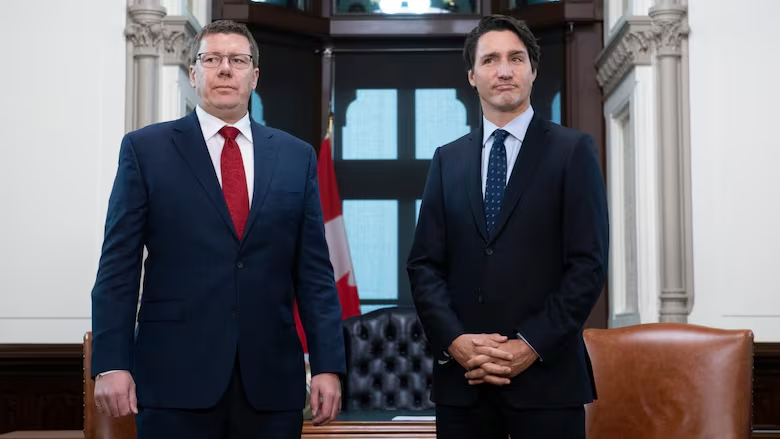Saskatchewan's rough ride
This week on the show: Saskatchewan Premier Scott Moe and whistleblower expert Tom Devine

Saskatchewan Premier Scott Moe is turning to a former prime minister to help boost his province's international trade.
The decision to hire Stephen Harper is in addition to what the prairie province already does to market its products abroad and drive international business, which include working with Ottawa's International Trade department and contacts in more than 150 countries, he told The House.
Moe, who leads the province's centre-right Saskatchewan Party, praised Harper's record and his ability to provide advice.
"It's really a good fit," he told The House.
The Saskatchewan government announced this week a $240,000 contract with Harper and Associates, the global-affairs firm run by the former PM, who was defeated by Justin Trudeau's Liberals in 2015. Saskatchewan is also opening trade offices in India, Japan and Singapore.
"This is about adding tools to Saskatchewan's tool box to increase our export wealth in our communities," Moe told The House.
"Our export wealth is the source of the wealth that we have here in Saskatchewan."
'A tissue paper shield': Expert slams Canadian protections for whistleblowers

Canada's weak whistleblower laws leave informants exposed to retribution and it's time to bolster protections before a crisis hits, says a U.S. expert.
"The current law is a fraud. It's consistently the object of ridicule globally among all the international whistleblower organizations," Tom Devine, the legal director of the Government Accountability Project, said in an interview with The House.
Devine, who has helped defend more than 7,000 whistleblowers worldwide and appeared before Canadian parliamentary committees, says the blowback on sources is more dangerous than ever, and Canadian laws are woefully inadequate to protect them.
He rates many democratic country's protections as a metal or cardboard shield — insufficient, but offering some safety to whistleblowers. Canada is the only country that fails to meet every single one of the 20 criteria his organization uses to judge protections.
"I would rate Canada's whistleblower law a tissue paper shield."
The debate surrounding protections for whistleblowers is re-emerging as the impeachment inquiry into U.S. President Donald Trump proceeds through Congress.
It focuses on a whistleblower complaint that alleges Trump tried to pressure Ukraine's President Volodymyr Zelensky in a July 25 phone call to investigate his political rival Joe Biden and his son, Hunter.
Trump has said he would "like to find out who is the whistle blower," but bantering about naming a witness is troubling to Devine.
"You're putting them on the firing line," he said.
Over the last decade, 306 people have submitted a complaint to the integrity commissioner, saying they suffered a reprisal for blowing the whistle. Only one person has completed the tribunal process, and that woman lost her case.
"If whistleblowers are scared into silence, our law enforcement people are going to be flying blind," Devine warned.
Devine has grave concerns about the future of Canada's whistleblower protections and says he fears change will come too late.
"What happens in the United States is when there's a tragedy, the politicians wake up and strengthen the whistleblower laws. I hope we don't have to wait for that in Canada."
Role of government house leader key in minority government

When Prime Minister Justin Trudeau unveils his new cabinet this week, who he chooses to be government house leader will be crucial because of the outsized role this person must play in the minority parliament.
"I think you're looking at an individual who can obviously work with the opposition parties and form a trusting relationship," David Zussman, who led Jean Chretien's transition team after the Liberals swept to power in 1993, told The House.
Zussman also led Chretien's transition teams in 1997 and 2000, and later wrote a book on the topic, Off and Running: The Prospects and Pitfalls of Government Transitions in Canada.
Michele Cadario led transition teams for former prime minister Paul Martin and former British Columbia premier Christy Clark.
She told The House Trudeau will be looking for someone who is a good communicator, fluently bilingual and experienced in the House of Commons. Cadario also says a person from a riding relatively close to Ottawa may also be key.
"You're spending a lot of time in the House of Commons, there's some practical issues with having someone from British Columbia," she said.
Asked to suggest who might be up for the job, Cadario named several MPs, including Steve MacKinnon (Gatineau), Greg Fergus (Hull-Aylmer) and David McGunity (Ottawa South).